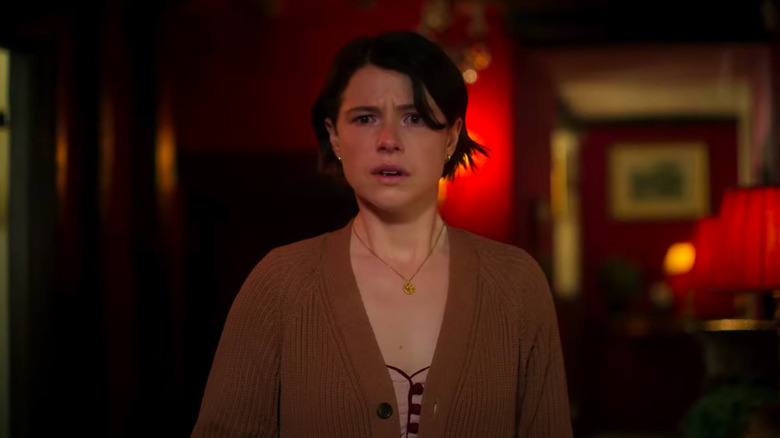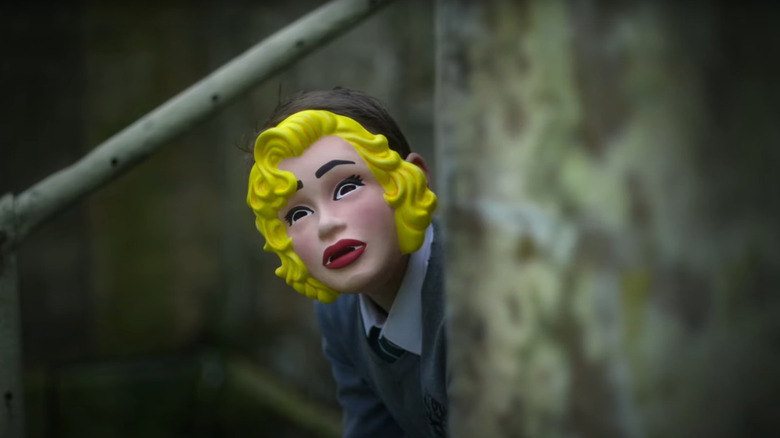Men Review: A Creepy, Mysterious Folk Horror Oddity That Will Leave You Both Disturbed And Puzzled
Alex Garland doesn't hold his audience's hand. Be it "Ex Machina," "Annihilation," or the FX series "Devs," Garland's recent work is deliberately mysterious, cloaked in more questions than answers. It's to his credit as a storyteller that we get the clear sense that he knows the answers himself, but he'd rather leave us, the viewer, to figure them out. There will be no denouement that spells things out. No bit of expository dialogue that finally ignites a lightbulb above our heads. This may drive some viewers crazy, but it's commendable that Garland is willing to trust his audience. "You may not have all the answers yet," Garland's work seems to be saying. "But that's okay. Maybe you should think on it for a while and see where you end up."
Garland's latest, the gruesome folk horror curiosity "Men," is no exception. Once again, the writer-director is deliberately taking us on a dark journey into the unknown, and willfully ignoring our questions. What does it all mean? Does it mean nothing at all? Your mileage here may vary, but Garland dolls out plenty of evocative imagery to plant seeds of knowledge in the darkest parts of our minds. None of this is to say "Men" is some impenetrable oddity. In some ways, this is one of Garland's most straightforward films; a familiar horror story of a woman away from home, suddenly surrounded by malevolent forces. Garland traffics in horror movie tropes here, right down to a lengthy home invasion-style sequence that's designed to give you the chills. And yet, nestled amongst all that familiarity is a strangeness; an uncanny world where everything is off-kilter and almost dream-like.
As "Men" begins, Harper Marlowe (Jessie Buckley) arrives at a quaint English country house tucked away in a small, quiet town. She's there for a getaway — and she's alone. We learn that she was married, but her husband James (Paapa Essiedu) has recently died. The circumstances of James' death become more clear as "Men" unfolds, but it's obvious from the start that Harper doesn't want to talk about it. Harper is greeted upon her arrival by Geoffrey (Rory Kinnear), the ruddy, befuddled owner of the house. He seems pleasant enough, if somewhat awkward. But awkwardness aside, Harper appears ready to decompress in the country. Unfortunately, her sunny arrival is the last pleasant moment she'll experience on this getaway.
This movie belongs to Rory Kinnear
Buckley has established herself as one of those performers who seems to be good in everything. She has a genuine screen presence and frequently manages to project a steadiness that feels on the verge of crumbling (see: "I'm Thinking of Ending Things" and "The Lost Daughter"). So it's no surprise that she creates a layered lead character here; the type of individual we can easily empathize with, and worry about as things grow increasingly dire. Her Harper seems unfailingly polite, but also unable to adequately voice her own frustrations and fears. As the situation around her becomes increasingly terrifying, she's often at a loss for words, and can only look on, mouth agape, eyes wide, as she wonders how any of this could be happening. At one point, she lets out a fierce, raw cry of anguish, and we can feel her cries vibrating our very bones.
But as good as Buckley is here, "Men" truly belongs to Kinnear. Indeed, this is a showcase for him, because Kinnear doesn't just play Geoffrey, he plays seemingly every male character who inhabits the village. Wherever Harper goes she encounters new men, all of whom are portrayed by Kinnear in various stages of make-up. At one point, Harper even encounters a rude, foul-mouthed child, with Kinnear's face digitally added to a young actor's body for maximum disturbing effect. Aside from Geoffrey, who really does come across as harmless, all of these male figures project a menacing air. A priest who first appears to offer Harper comfort quickly reveals himself to be a lecherous monster; a cop who comes to Harper's aid at first doesn't believe her claims; a man at a bar eyes her with what could be either lust or disgust, or maybe both. Kinnear manages to make every single one of his characters distinct, with each more unsettling than the last.
Does Harper notice that all of these men look practically the same? Buckley, and filmmaker Garland, don't let us know. There are moments here and there where Buckley's Harper will eye one of Kinnear's characters in a curious way. Is she recognizing the facial similarities? It's so deliberately underplayed that we can't say for sure, and that's part of the film's ominous power. Like Harper, we're never entirely sure what is going on here. We just know it's bad, and potentially deadly.
Garland couches it all with folk horror trappings; close-ups on woodlands that seem to ooze danger; ancient stonework from cultures and religions long since forgotten; a prevailing sense of wetness, and rot, and earthy textures. The filmmaker also doesn't shy away from gruesome gore, but also remembers to inject moments of absurd comedy to keep us forever off-balance. By the time "Men" reaches its delightfully deranged climax, you'll either be on board with what Garland and company are doing here, or you'll be ready to flee for the nearest exit. No matter how you end up feeling, you will leave "Men" with questions; questions you'll have to draw your own answers to. There's something exhilarating about a new movie that dares to leave us groping in the dark, wondering where the hell we're going to end up.
/Film Rating: 7.5 out of 10

